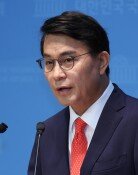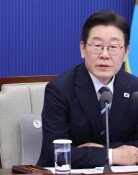Koreas Universities Facing Up to Plagiarism
Koreas Universities Facing Up to Plagiarism
Posted March. 02, 2007 07:02,
On January 26, the Professors Council of Korea University convened a meeting consisting of 30 professors from each college to decide whether or not then-president of the university Lee Pil-sang plagiarized his dissertations.
Before the meeting, the council hinted that it would easily reach a conclusion by saying, The fate of the president will be determined today. But the meeting dragged on for 10 hours, forcing the professors to skip their meals. The 10-hour heated debate failed to reach a consensus in the end, and the council handed in an empty report on the plagiarism case and the presidents statement to the Board of Directors of the university.
After the meeting, the professors said, Even though we are said to be experts on cases like this, we couldnt even agree on the definition of plagiarism. The conflicting opinions over the legitimacy of forming an investigative committee prevented us from reaching an agreement.
What are clear criteria in deciding what constitutes plagiarism? And who should investigate?
In the wake of a series of plagiarism controversies involving leading figures, such as former Deputy Prime Minister and Minister of Education and Human Resources Development Kim Byung-joon, former president of Korea University Lee Pil-sang, and professor Ma Kwang-soo of Yonsei University, the nations universities are rolling up the sleeves to come up with clear criteria for plagiarism.
Last month, the Korea University Professors Ethics Committee drafted a detailed guideline for plagiarism, and plans to finalize the draft in March, when the new semester starts.
The Hankuk University of Foreign Studies is launching a task force for research ethics guidelines this month, and in January Yonsei University opened a committee on research integrity. A Dongguk University spokesperson said, Eradication of plagiarism starts with changes in campus culture, and plans to run a pilot project called the Plagiarism Prevention Program.
Officials from these universities said, Reality on our campuses is that many professors are getting caught stealing others papers and students are copying their assignments. So we have been drawing up guidelines for plagiarism to upgrade university research culture even before the Ministry of Education and Human Resources Development and the Ministry of Science and Technology pushed us to do so.
The head of Korea Universitys Professors Ethics Committee, Kim Byung-ho, who teaches material science, pointed out, Because Korean universities do not have criteria for plagiarism, the more universities are globalized, open and sophisticated, the more problems over plagiarism, forgery and stealing of academic sources are likely to arise.
He added, Not only universities themselves, but also the government should make more efforts to upgrade university research ethics.
Local universities, including Korea University, have started waging a war on plagiarism in earnest.







